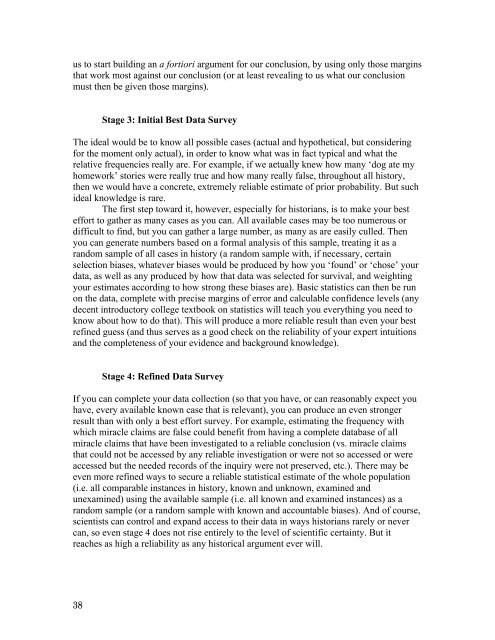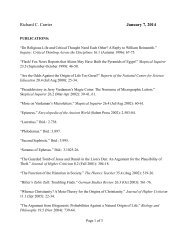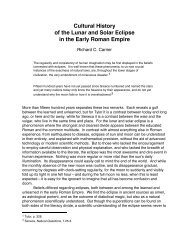“Bayes' Theorem for Beginners: Formal Logic and ... - Richard Carrier
“Bayes' Theorem for Beginners: Formal Logic and ... - Richard Carrier
“Bayes' Theorem for Beginners: Formal Logic and ... - Richard Carrier
You also want an ePaper? Increase the reach of your titles
YUMPU automatically turns print PDFs into web optimized ePapers that Google loves.
us to start building an a <strong>for</strong>tiori argument <strong>for</strong> our conclusion, by using only those margins<br />
that work most against our conclusion (or at least revealing to us what our conclusion<br />
must then be given those margins).<br />
38<br />
Stage 3: Initial Best Data Survey<br />
The ideal would be to know all possible cases (actual <strong>and</strong> hypothetical, but considering<br />
<strong>for</strong> the moment only actual), in order to know what was in fact typical <strong>and</strong> what the<br />
relative frequencies really are. For example, if we actually knew how many ‘dog ate my<br />
homework’ stories were really true <strong>and</strong> how many really false, throughout all history,<br />
then we would have a concrete, extremely reliable estimate of prior probability. But such<br />
ideal knowledge is rare.<br />
The first step toward it, however, especially <strong>for</strong> historians, is to make your best<br />
ef<strong>for</strong>t to gather as many cases as you can. All available cases may be too numerous or<br />
difficult to find, but you can gather a large number, as many as are easily culled. Then<br />
you can generate numbers based on a <strong>for</strong>mal analysis of this sample, treating it as a<br />
r<strong>and</strong>om sample of all cases in history (a r<strong>and</strong>om sample with, if necessary, certain<br />
selection biases, whatever biases would be produced by how you ‘found’ or ‘chose’ your<br />
data, as well as any produced by how that data was selected <strong>for</strong> survival, <strong>and</strong> weighting<br />
your estimates according to how strong these biases are). Basic statistics can then be run<br />
on the data, complete with precise margins of error <strong>and</strong> calculable confidence levels (any<br />
decent introductory college textbook on statistics will teach you everything you need to<br />
know about how to do that). This will produce a more reliable result than even your best<br />
refined guess (<strong>and</strong> thus serves as a good check on the reliability of your expert intuitions<br />
<strong>and</strong> the completeness of your evidence <strong>and</strong> background knowledge).<br />
Stage 4: Refined Data Survey<br />
If you can complete your data collection (so that you have, or can reasonably expect you<br />
have, every available known case that is relevant), you can produce an even stronger<br />
result than with only a best ef<strong>for</strong>t survey. For example, estimating the frequency with<br />
which miracle claims are false could benefit from having a complete database of all<br />
miracle claims that have been investigated to a reliable conclusion (vs. miracle claims<br />
that could not be accessed by any reliable investigation or were not so accessed or were<br />
accessed but the needed records of the inquiry were not preserved, etc.). There may be<br />
even more refined ways to secure a reliable statistical estimate of the whole population<br />
(i.e. all comparable instances in history, known <strong>and</strong> unknown, examined <strong>and</strong><br />
unexamined) using the available sample (i.e. all known <strong>and</strong> examined instances) as a<br />
r<strong>and</strong>om sample (or a r<strong>and</strong>om sample with known <strong>and</strong> accountable biases). And of course,<br />
scientists can control <strong>and</strong> exp<strong>and</strong> access to their data in ways historians rarely or never<br />
can, so even stage 4 does not rise entirely to the level of scientific certainty. But it<br />
reaches as high a reliability as any historical argument ever will.








